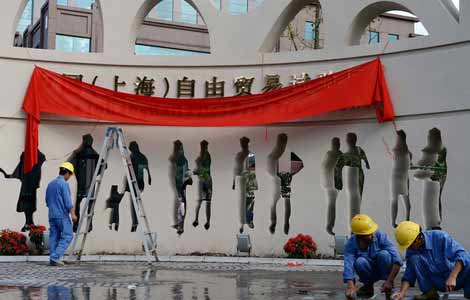Police chief suspended after boy released
Updated: 2013-09-25 07:44
By An Baijie (China Daily)
|
||||||||
Youth's online post said to fuel public protest
A county police chief in Gansu province was suspended on Tuesday, a day after county authorities released a 16-year-old boy from a seven-day detention for spreading rumors on the Internet.
Provincial authorities did not divulge any details as to why Bai Yongqiang, director of public security for Zhangjiachuan Hui autonomous county, was suspended, but it happened coincidentally after 16-year-old Yang Hui was released from custody after calling on netizens to protest the police's handling of a man's death on the morning of Sept 12.
Police said the man, surnamed Gao, died after falling from a building. In an online post, Yang wrote that Gao was murdered and that the police had lied.
"We should parade (and protest)," he wrote.
Hundreds of people gathered on Sept 14 to protest around the building where the man died. Police said Yang's post fueled the protests.
The middle school student was detained on Sept 17, according to the Gansu provincial public security department.
An autopsy showed the man was not murdered, police of Zhangjiachuan Hui autonomous county said in a statement. On Sept 18, the county public security bureau said Yang's rumors "gravely disturbed social order" and "caused a bad social influence".
Yang's detention sparked a widespread outcry and Internet users went on to claim that Bai, the director of the county-level public security bureau, had paid up to 50,000 yuan ($8,170) in bribes from 1995 to 2005 to a corrupt official.
On Monday, Gansu's public security department said police had released Yang because he is an adolescent and had expressed regret for his conduct. But Yang told Southern Metropolis Daily he did not regret his behavior but that he will verify the facts before spreading information online in the future.
Analysts and observers said on Tuesday that authorities attempting to control public opinion are misusing a new judicial interpretation against the spreading of rumors online.
The guidelines, jointly released by the Supreme People's Court and Supreme People's Procuratorate on Sept 9, state that Internet users who share false information that is defamatory or harms national interest face up to three years in prison.
In Yang's case, police said his post had been forwarded more than 500 times, creating grounds for prosecution.
The judicial interpretation was made to protect the people's legal interests rather than empower the government to control public opinion, said social commentator Fan Dayu.
He said the guidelines state that whistle-blowers should not be prosecuted, even if they unintentionally create defamatory comments. Fan added that authorities did not have enough evidence to prove that Yang's post caused the public gathering and disturbed social order.
Jin Yong, a professor of media studies at the Communication University of China, said many corruption cases have been brought to light by netizens using social media.
Online supervision of officials should be encouraged rather than denounced, he added.
anbaijie@chinadaily.com.cn
(China Daily USA 09/25/2013 page5)

 World leaders at UN General Assembly
World leaders at UN General Assembly
 China to inaugurate Shanghai FTZ on Sept 29
China to inaugurate Shanghai FTZ on Sept 29
 China's investment a 'job-saver' in Europe
China's investment a 'job-saver' in Europe
 Pollution control plan to slash PM2.5
Pollution control plan to slash PM2.5
 The beauty and beasts of selling hot houses
The beauty and beasts of selling hot houses
 Tian'anmen's flowery moments for National Day
Tian'anmen's flowery moments for National Day
 When animals meet beer
When animals meet beer
 Microsoft revamps Surface to challenge Apple
Microsoft revamps Surface to challenge Apple
Most Viewed
Editor's Picks

|

|

|

|

|

|
Today's Top News
Ultra wealthy population shrinks in China: report
White House to enroll millions in Obamacare
Brazilian president blasts US for spying
Kenya mall siege 'over' but death toll unclear
China to inaugurate Shanghai FTZ on Sept 29
Chinese, French FMs meet over Syria
93 killed as quake hits SW Pakistan
Smithfield deal 'great' for US shareholders: CEO
US Weekly

|

|




